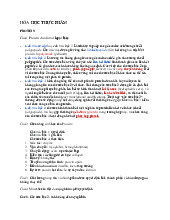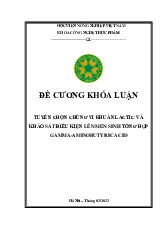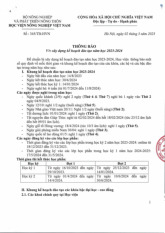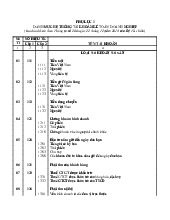


Preview text:
Program Information
Promoting Sustainable and Nutrition-sensitive Agriculture Development
in the Lancang- Mekong Countries March-September 2024 Mekong Institute 1. BACKGROUND
Agriculture has always been an integral part of the economies of the Lancang- Mekong (LM)
Countries: Cambodia, P.R. China, Lao PDR, Myanmar, Thailand, Viet Nam (CCLMTV). It
accounts for 7-20 percent of GDP and is a crucial source of employment in the six countries.
Despite the impressive growth in agricultural production, the current agriculture systems are yet
to meet the nutrition needs of the current population. Like other parts of the world, the region faces
the triple burden of nutrition-undernourishment, overweight, and obesity, as well as micro-nutrient
deficiency. Nutrition insecurity is particularly prevalent among women and young children.
There is a growing discourse on promoting sustainable agriculture that could provide net-positive
impacts on nutrition, the environment, and farmer livelihoods as a viable solution. However, it is
challenging to implement such agriculture practices by linking them with nutrition outcomes. It
requires a multidisciplinary approach that could intersect with agriculture growth, water, soil
management, health, gender, nutritional education, etc. When it comes to sustainable agricultural
practices, some of them may work in one location. Yet, they may provide different results in
different geo-environmental settings. Thus, knowledge and technical exchange activities among
the regional countries are essential to understand what works well based on each context.
Mekong Institute (MI) has been working on agriculture development and cooperation as the core
program for the past 25 years. The capacity development programs of MI pay an emphasis on
bridging multi-country engagement, as well as helping instil synergies among regional cooperation
mechanisms. In pursuit of it, MI, supported by the People's Government of the People's Republic
of China is implementing a regional capacity development program on "Promoting Sustainable
and Nutrition-sensitive Agriculture Development in the Lancang- Mekong Countries" between
March and September, 2024. This program aims at enhancing knowledge of critical entry points
where nutrition goals could be incorporated into the sustainable agricultural production system. 1 2. OBJECTIVES
The capacity development program aims to enhance the professional capacity of key stakeholders
in integrating nutrition goals into sustainable agriculture production systems. The participants are
also expected to contribute to strengthening the regional knowledge exchange culture on climate-
smart agriculture and nutrition security. At the end of the program, participants will be able to
Improve knowledge of climate-smart agriculture and agroecological farming;
Identify entry points for mainstreaming nutrition in sustainable agricultural; and
Enhance understanding of sustainable soil and water management for nutrition-sensitive agriculture. 3. COMPONENTS
The project includes the following components.
Component 1: Regional Learning Program (March 25 - April 5, 2024)
Component 2: Country-wise Action Plan Implementation (April-August, 2024)
Component 3: Online Synthesis and Evaluation Workshop (August, 2024)
Component 4: Webinar (July, 2024)
Component 1: Regional Learning Program (March 25 - April 5, 2024)
The 2-week regional learning program will be held in Khon Kaen Province and Bangkok, Thailand.
The training will invite trainers from P.R. China, Thailand, and other seasonal experts working on
regional nutritional security and sustainable agriculture systems. The program will also integrate
field visits at the Bangkok Metropolitan Region and the North-eastern part of Thailand.
Component 2: Country-wise Action Plan Implementation
After the learning program, the trained participants are expected to implement country-wise action
plans in their respective countries. Action plans could be designed as localized events or surveys
that could contribute to promoting nutrition security and sustainable agriculture.
Component 3: Online Synthesis and Evaluation Workshop
The one-day synthesis and evaluation workshop will be held online to exchange lessons learned
and good practices from the action plan implementation. Component 4: Webinar
This webinar will share nutrition security programming in agriculture production with a broader
audience. This event aims to harness the selected participants from the learning program as public
speakers by sharing successful country and regional initiatives alongside regional experts. 2 4. TARGET PARTICIPANTS
Twenty-Four (24) Participants: The target participants are government officials, representatives of
academic institutes, businesses, and NGOs directly working on agriculture and nutrition security
programs in Cambodia, P.R. China, Lao PDR, Myanmar, Thailand, and Viet Nam. 5. TENTATIVE AGENDA
Component 1: Regional Learning Program (March 25 – April 5, 2024)
Place: 1. Mekong Institute, Khon Kaen, Thailand 2. Bangkok Time March 25 March 26 March 27 March 28 March 29 (GMT+7) Day 1 Day 2 Day 3 Day 4 Day 5 09:00-12:00 Opening Module 1 Module 2 Field Visit Reflection 12:00-13:00 Lunch Break Module 1 Module 2 Module 3 Field Visit Module 3 13:00-17:00
March 30: Khon Kaen City Tour March 31: Holiday Time April 1 April 2 April 3 April 4 April 5 (GMT+7) Day 1 Day 2 Day 3 Day 4 Day 5 09:00-12:00 Travel to Module 4 Action plan Field Visit Reflection Bangkok 12:00-13:00 Lunch Break Field Visit Wrap Up 13:00-17:00 Module 4 Action Plan Orientation Field Visit in Bangkok Closing 3



